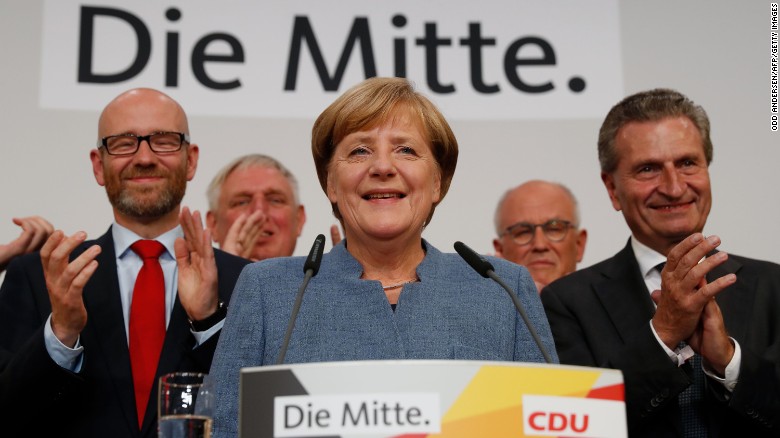
It was supposed to look effortless, German Chancellor Angela Merkel gliding to victory in this year’s federal election. But the roughly 33.5% of seats that she won — according to exit polls — was less than anticipated, even though she secured her conservative party, the Christian Democrats (CDU), a fourth term in office.
More laborious for the Chancellor will be nailing down a willing coalition partner — or even an unwilling coalition partner, if it comes to that. Despite the far-right Alternative for Germany’s (AfD) expected 13% tally, it will not be among those in the picture.
As soon as possible, she’ll need to get to business and start tackling the big-ticket, red-button issues afflicting Germany: EU reform, the eurocrisis, migration, Putin’s Russia and Trump’s United States — all of which were largely glossed over in the tame election campaign.
Germany may appear to be a paragon of stability and purposefulness from the outside, but Merkel’s way forward is indefinite and studded with pitfalls — as the election results show.
Regardless of the government’s eventual composition, it will come to the table with a daunting array of problems before it — and precious little in terms of vision or preconceived strategy to take them on.
The EU is in shambles, for example, with far-right, Euroskeptic parties on the rise everywhere, now even in Germany. The AfD made it into the Bundestag for the first time, with a result that could make it the strongest opposition party.
Meanwhile, Russia recently held high profile military exercises on the EU’s eastern borders and parts of Ukraine remain occupied. Trump’s off-the-cuff remarks about cutting Europe loose from the transatlantic alliance leave all of Europe in geo-strategic limbo.
And then there’s Turkey’s autocratic Recep Tayyip Erdogan, whose war of words against Germany has relations at an all-time low.
Merkel’s final term will stamp an indelible imprint on Germany, and perhaps even Europe as a whole. But the CDU’s coalition partner will inflect that legacy, not least because of the conservatives’ dearth of substance, one of the factors accounting for the CDU’S poor performance.
Merkel’s cohort of choice is surely the Social Democrats (SPD), with whom she’s governed with affably for eight of her twelve years in office. The centrist Merkel, a liberal in her own party, is jokingly referred to as “Germany’s best Social Democratic chancellor ever.”
But the SPD’s profile — and its voter bloc, too — has shriveled significantly during the years of the so-called “grand coalitions,” from 34% in 2005 to 21% in 2017, a postwar low. The SPD desperately wants out of the suffocating alliance with Merkel, but the imperative to form a competent administration may hold sway in the end.
The SPD, with the career EU politico Martin Schulz as foreign minister, would be the perfect partner to aid Merkel in reforming the eurozone and the EU in general, a project for which they have an ambitious colleague in the French president Emmanuel Macron.
Moreover, the SPD says it will make any coalition it joins dependent on the CDU accepting a vigorous rejuvenation of Germany’s social welfare state, the post-war era’s social equality having given way to a yawning gap between rich and poor in Germany.
The SPD’s “non-negotiable” conditions for participation in a coalition include: equal pay for men and women, free education including nursery school, and capping the retirement age at 67.
The tandem of the environmentalist Greens and the neo-liberal Free Democrats (FDP) are the other possibilities. The Greens and the CDU, once rivals at opposite ends of the political spectrum, are no longer such an odd couple.
CDU-Green coalitions exist at state-level, and a Merkel-led CDU could get along with the new, moderately minded Greens. The Greens will almost certainly demand the environment ministry in order to ensure that Germany hits its climate goals, which are currently in jeopardy.
But the little ecological party alone is not enough to form a government.
The liberal FDP, a pro-business, free-market party that was jettisoned from the Bundestag four years ago, staged a dramatic comeback, garnering 10% of the vote.
In the post-war decades, the liberals were the CDU’s standard coalition partner, both of them right-wing parties. But times have changed: the FDP is today considerably further to the right of Merkel’s gentle version of the CDU.
The Germany-first FDP says it refuses to tie the eurozone closer together if that means Germany bending on any kind of transfers or structures that diminish its power or coffers. The Free Democrats would tie Merkel’s hands in negotiating EU reform together with Macron, probably making it almost impossible.
The option of a three-way coalition between the CDU, the FDP and the Greens is to no one’s liking, but with so few options, it is now a relevant option. The Germans call this a “Jamaica coalition,” the colors of the Jamaican flag — black, yellow and green — being those of the three German parties.
But while Jamaica evokes images of rum, dancing, and beaches, this option-of-last-resort would be anything but fun. The Greens and the FDP stand on opposite sides on environment, social welfare, immigration, and education. The alliance would be unruly and conflicted from day one, not the best starting point to lead the free world, as some observers have called upon Germany to do.
Indeed, before heading up the free world, Merkel has to lead Germany and hopefully, together with Macron, Europe, too.
Yet she won’t hit the ground running, not with this result, and the coalition could slow her down. For Merkel, her final sweeping election victory earning her a fourth term as Chancellor won’t be the result she fondly remembers. But still, in hindsight, it might look like the easiest part of her last term in office.
As reported by CNN
